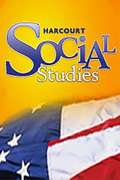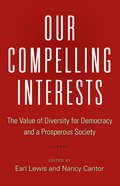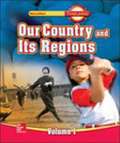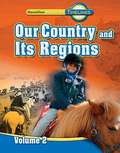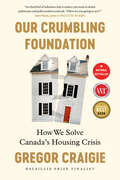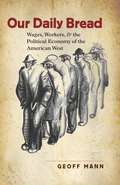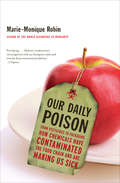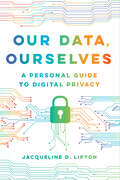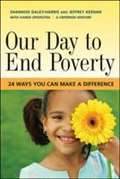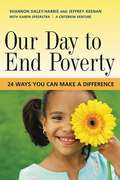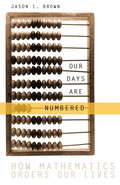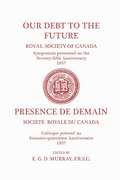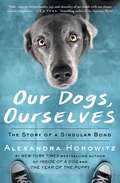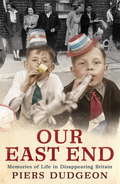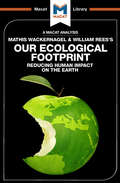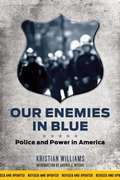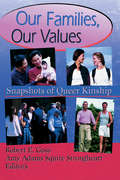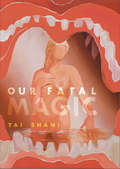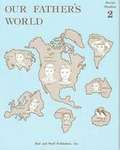- Table View
- List View
Our Communities
by Myra Zarnowski Merry M. Merryfield Peter Rees Phillip J. VanfossenNIMAC-sourced textbook
Our Communities 3rd Grade
by Richard G. Boehm James A. Banks Kevin P. Colleary Walter C. Parker Gloria Contreras Mary A. Mcfarland A. Lin GoodwinA social studies textbook.
Our Community Center (Places in Our Community)
by Lisa J. AmstutzThe community center is an important part of our community. Lots of people work together to make our community center a great place to be. Readers will learn about who works at the community center, what the workers do, and what makes a community center special. Simple, at-level text and vibrant photos help readers learn all about community centers.
Our Community and Beyond, Student Edition
by Bert Bower Teachers' Curriculum InstituteNIMAC-sourced textbook
Our Compelling Interests: The Value of Diversity for Democracy and a Prosperous Society
by Earl Lewis Nancy CantorIt is clear that in our society today, issues of diversity and social connectedness remain deeply unresolved and can lead to crisis and instability. The major demographic changes taking place in America make discussions about such issues all the more imperative. Our Compelling Interests engages this conversation and demonstrates that diversity is an essential strength that gives nations a competitive edge. This inaugural volume of The Andrew W. Mellon Foundation's Our Compelling Interests series illustrates that a diverse population offers our communities a prescription for thriving now and in the future. This landmark essay collection begins with a powerful introduction situating the demographic transitions reshaping American life, and the contributors present a broad-ranging look at the value of diversity to democracy and civil society. They explore the paradoxes of diversity and inequality in the fifty years following the civil rights legislation of the 1960s, and they review the ideals that have governed our thinking about social cohesion--such as assimilation, integration, and multiculturalism--before delving into the new ideal of social connectedness. The book also examines the demographics of the American labor force and its implications for college enrollment, graduation, the ability to secure a job, business outcomes, and the economy. Contributors include Danielle Allen, Nancy Cantor, Anthony Carnevale, William Frey, Earl Lewis, Nicole Smith, Thomas Sugrue, and Marta Tienda. Commentary is provided by Kwame Anthony Appiah, Patricia Gurin, Ira Katznelson, and Marta Tienda.At a time when American society is swiftly being transformed, Our Compelling Interests sheds light on how our differences will only become more critical to our collective success.
Our Country and Its Regions, Volume 1 [Grade 4]
by Dinah Zike James A. Banks Kevin P. Colleary Linda Greenow Walter C. Parker Emily M. SchellMacmillian/McGraw-Hill TIMELINKS Grade 4 (or grade 5 or 6) builds geographic mastery with maps and skills, offers reading skills and strategies to reinforce Reading/Language Arts skills, and integrates Dinah Zike's Foldables® to help students improve comprehension. * Two volumes per grade * Available as single copies or in grade level sets
Our Country and Its Regions, Volume 2 [Grade 4]
by Dinah Zike James A. Banks Kevin P. Colleary Linda Greenow Walter C. Parker Emily M. SchellMacmillian/McGraw-Hill TIMELINKS Grade 4 (or grade 5 or 6) builds geographic mastery with maps and skills, offers reading skills and strategies to reinforce Reading/Language Arts skills, and integrates Dinah Zike's Foldables® to help students improve comprehension. * Two volumes per grade * Available as single copies or in grade level sets
Our Country's Regions 4th Grade
by Richard G. Boehm James A. Banks Kevin P. Colleary Walter C. Parker Gloria Contreras Mary A. Mcfarland A. Lin GoodwinOur Country's Regions examines the geography, history, and economies of different regions in our country
Our Crumbling Foundation: How We Solve Canada's Housing Crisis
by Gregor CraigieAn urgent and illuminating examination of the unrelenting housing crisis Canadians find ourselves facing, by Balsillie Prize finalist and CBC Radio host Gregor Craigie, Our Crumbling Foundation offers real-life solutions from around the world and hope for new housing innovation in the face of seemingly impossible obstacles.Canada is experiencing a housing shortage. Although house prices in major Canadian cities appear to have topped out in early 2023, new housing isn&’t coming onto the market quickly enough. Rising interest rates have only tightened the pressure on buyers, and renters, too, as rising mortgage rates cost landlords more, which are passed along to tenants in rent increases. Even with the recent federal budget commitment to bring more housing online by 2030, there will still be a shortfall of 3.5 million homes by 2030.Gregor Craigie is a CBC journalist in Victoria, one of the highest-priced housing markets in the country. On his daily radio show On The Island he's been talking for over 15 years to local experts and to those across the country about housing. Craigie has travelled to many of the places he profiles in the book, and in his interviews with Canadians he presents the human face of the shortfall as he speaks with renters, owners and homeless people, exploring their varying predicaments and perspectives. He then shows, through comparable profiles of people across the globe, how other North American and international jurisdictions (Tokyo, Paris, Berlin, Helsinki, Singapore, Ireland, to name a few) are housing their citizens better, faster and with determination—solutions that could be put into practice here.With passion, knowledge and vigour, Craigie explains how Canada reached this critical impasse and will convince those who may not yet recognize how badly our entire country is in need of change. Our Crumbling Foundation provides hope for finding our way out of the crisis by recommending a number of approaches at all levels of government. The prescription for how we&’re going to house ourselves and do so equitably, requires not just a business solution, nor simply a social solution.
Our Daily Bread
by Geoff MannA wage is more than a simple fee in exchange for labor, argues Geoff Mann. Beyond being a quantitative reflection of productivity or bargaining power, a wage is a political arena in which working people's identity, culture, and politics are negotiated and developed. In Our Daily Bread, Mann examines struggles over wages to reveal ways in which the wage becomes a critical component in the making of social hierarchies of race, gender, and citizenship.Combining a fresh analysis of radical political economy with a critical assessment of the role of white men in North American labor politics, Mann addresses the issue of class politics and places the problem of "interests" squarely at the center of political economy. Rejecting the idea that interests are self-evident or unproblematic, Mann argues that workers' interests, and thus wage politics, are the product of the ongoing effort by wage workers to focus on quality in a socioeconomic system that relentlessly quantifies. Taking three wage disputes in the natural resources industry as his case studies, Mann demonstrates that wage negotiation is not simply emblematic of economic conflict over the distribution of income but also represents critical contests in the cultural politics of identity under capitalism.
Our Daily Poison: From Pesticides to Packaging, How Chemicals Have Contaminated the Food Chain and Are Making Us Sick
by Marie-Monique Robin&“An enlightening and deeply disturbing account&” of the dangerous chemicals that have infiltrated our food, by the Rachel Carson Prize–winning journalist (Booklist). Our Daily Poison is &“a gripping and urgent book&” for anyone concerned about democracy, corporate power, or public health (Raj Patel, author of Stuffed and Starved). In it, award-winning journalist and filmmaker Marie-Monique Robin travels across North America, Europe, and Asia to document the shocking array of chemicals we encounter in our daily lives—from the pesticides that blanket our crops to the additives and plastics that contaminate our food—and their effects on our health over time. Following the trail of the synthetic molecules in our environment and our food, Robin traces the ugly history of industrial chemical production, as well as the shoddy regulatory system for chemical products that still operates today. Using scientific studies, expert testimony, and interviews with farmworkers suffering from acute chronic poisoning, Robin demonstrates how corporate interests—and our own ignorance—may be costing us our lives. &“What Rachel Carson&’s groundbreaking Silent Spring did for the environmental movement, Robin is doing for awareness of toxins in the food chain.&” —Publishers Weekly &“This may be one of the most important books of the year.&” —Kirkus Reviews &“Full of facts, stories, and wisdom.&” —The Huffington Post
Our Data, Ourselves: A Personal Guide to Digital Privacy
by Jacqueline D. LiptonA practical, user-friendly handbook for understanding and protecting our personal data and digital privacy. Our Data, Ourselves addresses a common and crucial question: What can we as private individuals do to protect our personal information in a digital world? In this practical handbook, legal expert Jacqueline D. Lipton guides readers through important issues involving technology, data collection, and digital privacy as they apply to our daily lives.Our Data, Ourselves covers a broad range of everyday privacy concerns with easily digestible, accessible overviews and real-world examples. Lipton explores the ways we can protect our personal data and monitor its use by corporations, the government, and others. She also explains our rights regarding sensitive personal data like health insurance records and credit scores, as well as what information retailers can legally gather, and how. Who actually owns our personal information? Can an employer legally access personal emails? What privacy rights do we have on social media? Answering these questions and more, Our Data, Ourselves provides a strategic approach to assuming control over, and ultimately protecting, our personal information.
Our Day to End Poverty: 24 Ways You Can Make a Difference
by Shannon Daley-Harris Jeffrey Keenan Karen SpeerstraImagine ending poverty at home and around the globe in our own lifetimes. Imagine your actions combining with others' actions to make poverty history.
Our Day to End Poverty: 24 Ways You Can Make a Difference
by Shannon Daley-Harris Jeffrey Keenan Karen SpeerstraOur Day to End Poverty invites us to look at the twenty-four hours in our very ordinary days and to begin to think about poverty in new and creative ways. The authors offer scores of simple actions anyone can take to help eradicate poverty. Each chapter takes a task we undertake during a typical day and relates it to what we can do to ease the world's suffering. We begin by eating breakfast, so the first chapter focuses on alleviating world hunger. We take the kids to school--what can we do to help make education affordable to all? In the afternoon we check our email--how can we ensure the access to technology that is such an important route out of poverty? The chapters are short and pithy, full of specific facts, resources for learning more, and menus of simple, often fun, and always practical action steps. Anne Frank wrote, "How wonderful it is that nobody need wait a single moment before starting to improve the world." Let's get started. It is our day to end poverty.
Our Days Are Numbered
by Jason BrownA revealing and entertaining look at the world, as viewed through mathematical eyeglasses.From the moment our feet touch the floor in the morning until our head hits the pillow, numbers are everywhere. And yet most of us go through each day unaware of the mathematics that shapes our lives.In fact, many people go through life fearing and avoiding mathematics, making choices that keep it at arm's length or further. Even basic math -- like arithmetic -- can seem baffling.In Our Days Are Numbered, Jason Brown leads the reader through a typical day, on a fascinating journey. He shows us the world through a mathematician's eyes and reveals the huge role that mathematics plays in our lives. It lies hidden within the electronics we use, the banking we do, and even the leisure activities we enjoy. Whether we're putting a down payment on a new car, reading the financial pages, or listening to our favourite songs, math is behind it all.At once entertaining and informative, Our Days Are Numbered covers an array of mathematic concepts and explores the hidden links between mathematics and everyday life. Brown reveals that a basic understanding of math can make us more creative in the way we approach the world.From the Hardcover edition.
Our Debt to the Future: Royal Society of Canada, Symposium presented on the Seventy-fifth Anniversary 1957 (The Royal Society of Canada Special Publications #2)
by E.G.D. MurrayAT ITS ANNUAL MEETING in 1957, the Royal Society of Canada, celebrating the seventy-fifth anniversary of its foundation, departed from the accustomed pattern of its meetings. Instead of assembling in separate sections, Fellows from each Section of the Society were asked to contribute to a conspectus, focused by their specialized knowledge and trained discrimination, to reveal to the Society and to others certain trends and tendencies in Canada. Subjects and contributors are: "These Seventy-Five Years" (Presidential Address by W. A. Mackintosh); "The Roles of the Scientist and the Scholar in Canada's Future" (W. A. Mackintosh, David L. Thomson); "The Penalties of Ignorance of Man's Biological Dependence" (E. G. D. Murray, K. W. Neatby, I. McT. Cowan, G. H. Ettinger, R. H. Manske); "The Social Impact of Modern Technology" (N. A. M. MacKenzie, V. W. Bladen, E. W. R. Steacie, W. H. Watson); "Our Economic Potential in the Light of Science" (H. C. Gunning, J. E. Hawley, L. M. Pidgeon, B. S. Keirstead, Maurice Lamontagne); "Human Values and the Evolution of Society" (G.-H. Lévesque, T. W. M. Cameron, A. S. P. Woodhouse, R. Elie, Roy Daniells); "Let Us Look to Our Human Resources" (F. H. Underhill, J. K. W. Ferguson, L.-P. Dugal, W. B. Lewis). The volume is further prefaced by the address given by His Excellency the Right Honourable Vicent Massey, Governor-General of Canada, "The Weighing of Ayre."
Our Dogs, Ourselves: The Story of a Singular Bond
by Alexandra HorowitzFrom Alexandra Horowitz, #1 New York Times bestselling author of Inside of a Dog, an eye-opening, informative, and wholly entertaining examination and celebration of the human-canine relationship for the curious dog owner and science-lover alike.We keep dogs and are kept by them. We love dogs and (we assume) we are loved by them. We buy them sweaters, toys, shoes; we are concerned with their social lives, their food, and their health. The story of humans and dogs is thousands of years old but is far from understood. In Our Dogs, Ourselves, Alexandra Horowitz explores all aspects of this unique and complex interspecies pairing. As Horowitz considers the current culture of dogdom, she reveals the odd, surprising, and contradictory ways we live with dogs. We celebrate their individuality but breed them for sameness. Despite our deep emotional relationships with dogs, legally they are property to be bought, sold, abandoned, or euthanized as we wish. Even the way we speak to our dogs is at once perplexing and delightful. In thirteen thoughtful and charming chapters, Our Dogs, Ourselves affirms our profound affection for this most charismatic of animals—and opens our eyes to the companions at our sides as never before.
Our East End: Memories of Life in Disappearing Britain
by Piers DudgeonThis ebook edition contains the full text version as per the book. Doesn't include original photographic and illustrated material. This oral history of London's East End spans the period after the First World War to the upsurge of prosperity at the beginning of the 60s - a time which saw fresh waves of immigrants in the area, the Fascist marches of the 30s and its spirited recovery after virtual obliteration during the Blitz. Piers Dudgeon has listened to dozens of people who remember this fiercely proud quarter to record their real-life experiences of what it was like before it was fashionable to buy a home in the Docklands. They talk of childhood and education, of work and entertainment, of family, community values, health, politics, religion and music. Their stories will make you laugh and cry. It is people's own memories that make history real and this engrossing book captures them vividly.
Our East End: Memories of Life in Disappearing Britain
by Piers DudgeonThis ebook edition contains the full text version as per the book. Doesn't include original photographic and illustrated material. This oral history of London's East End spans the period after the First World War to the upsurge of prosperity at the beginning of the 60s - a time which saw fresh waves of immigrants in the area, the Fascist marches of the 30s and its spirited recovery after virtual obliteration during the Blitz. Piers Dudgeon has listened to dozens of people who remember this fiercely proud quarter to record their real-life experiences of what it was like before it was fashionable to buy a home in the Docklands. They talk of childhood and education, of work and entertainment, of family, community values, health, politics, religion and music. Their stories will make you laugh and cry. It is people's own memories that make history real and this engrossing book captures them vividly.
Our Ecological Footprint
by Luca MarazziOur Ecological Footprint presents a powerful model for measuring humanity’s impact on the Earth to reduce the harm we are causing the planet before it’s too late. While some people believe we can find a middle ground between environmental conservation and economic development, or that future technological discoveries will solve the problem, the authors warn that our planet’s limited resources simply can’t support an economic system based on unlimited growth. Our Ecological Footprint offers a valuable tool to help us live more sustainably and safeguard our natural resources for generations to come.
Our Enemies in Blue
by Kristian WilliamsLet's begin with the basics: violence is an inherent part of policing. The police represent the most direct means by which the state imposes its will on the citizenry. They are armed, trained, and authorized to use force. Like the possibility of arrest, the threat of violence is implicit in every police encounter. Violence, as well as the law, is what they represent.Using media reports alone, the Cato Institute's last annual study listed nearly seven thousand victims of police "misconduct" in the United States. But such stories of police brutality only scratch the surface of a national epidemic. Every year, tens of thousands are framed, blackmailed, beaten, sexually assaulted, or killed by cops. Hundreds of millions of dollars are spent on civil judgments and settlements annually. Individual lives, families, and communities are destroyed.In this extensively revised and updated edition of his seminal study of policing in the United States, Kristian Williams shows that police brutality isn't an anomaly, but is built into the very meaning of law enforcement in the United States. From antebellum slave patrols to today's unarmed youth being gunned down in the streets, "peace keepers" have always used force to shape behavior, repress dissent, and defend the powerful. Our Enemies in Blue is a well-researched page-turner that both makes historical sense of this legalized social pathology and maps out possible alternatives.Kristian Williams is the author of several books, including American Methods: Torture and the Logic of Domination. He co-edited Life During Wartime: Resisting Counterinsurgency, and lives in Portland, Oregon.
Our Families, Our Values: Snapshots of Queer Kinship
by Robert Goss Amy Adams Squire StrongheartOur Families, Our Values challenges both the gay community and American society to examine carefully the meaning of family values and the nature of social institutions such as marriage and the family. It asks you provoking, even disturbing, questions such as: “Is it prudent for members of the Lavender community to mimic heterosexual marriage or define personal relations networks as families, when these institutions are rapidly collapsing?” “Are we attempting to mainstream American society into accepting different views of marriage and families?” “Are we subscribing to notions of sexual property that are inherent to the marriage ceremony and the institution of marriage, when we choose to be married?” Despite the complexities of this issue, marriage constitutes a privileged position in western society, and, as this book shows you, without the legal recognition of same-sex marriages, there are many fundamental rights, as well as privileges, denied to gay, lesbian, bisexual, and transgendered persons.As Our Families, Our Values turns upside-down the widely accepted notion that only heterosexual people are entitled to get married, have sex, and rear children, you gain insight into personal struggles and affirmations that testify to the spirituality, procreativity, and wholesomeness of the diverse relationships of the Lavender community. You will also learn about various ongoing efforts to give religious pride to the various configurations of gay relationships, families, and values and the disruption of popular interpretations of the Scriptures that have been used to justify the oppression of sexual minorities. This book will intrigue you over and over again, as you read about: value systems transphobia equal marriage rights Buddhism’s rejection of “traditional family values” Brazil’s sex-positive culture differences between gay male social formations and families choosing a language and terms that empower sexual minorities and the essence of the liberation movement sex as communion relationships based on nurture, not transactionDesigned for academics and students of religion, pastors, priests, rabbis, and lay readers alike, Our Families, Our Values is a multifaceted view of the gay community’s response to the public controversy over gay marriage, adoption, and foster care rights. Ideal as a textbook for courses in sexuality, theology, sociology, women’s studies, and gay and lesbian studies, this book will both inform you and delight you as it reminds you that same-sex unions bring much cause for celebration and that religion and homosexuality are not mutually exclusive.
Our Farmers' Market (Places in Our Community)
by Mary MeinkingOur farmers' market is a busy place! Lots of community helpers work at the farmers' market. Readers will learn about who works at a farmers' market, what the workers do, and what makes a farmers' market special. Simple, at-level text and vibrant photos help readers learn all about farmers' markets in the community.
Our Fatal Magic (Strange Attractor Press)
by Tai ShaniFeminist science fiction that anticipates a post-patriarchal future. Our Fatal Magic is a collection of feminist science fiction by contemporary artist Tai Shani. Foregrounding explorations of sensation, experience, and interiority, these twelve fantastical prose vignettes refract their ideas through a series of curious characters, from Medieval Mystics to Cubes of Flesh, from Sirens to Neanderthal Hermaphrodites. Drawing on the speculative narrative strategies pioneered by writers like Marge Piercy, Octavia Butler and others, Our Fatal Magic metabolizes new and necessary fictions from feminist and queer theory to propose an erotic, often violent space of critique in which gender constructs are destabilized, alternative histories imagined, and post-patriarchal futures proposed.
Our Father's World: Grade 2
by Lester Miller Susie Hoover Brenda McdowellA simple Geography course that introduces and explains basic geographical terms and surface features, and introduces the purpose and structure of globes and maps. Twelve of the 30 lessons are stories about children around the world. The meaning and use of the new words used are taught by fill-in-the-blank exercises.
